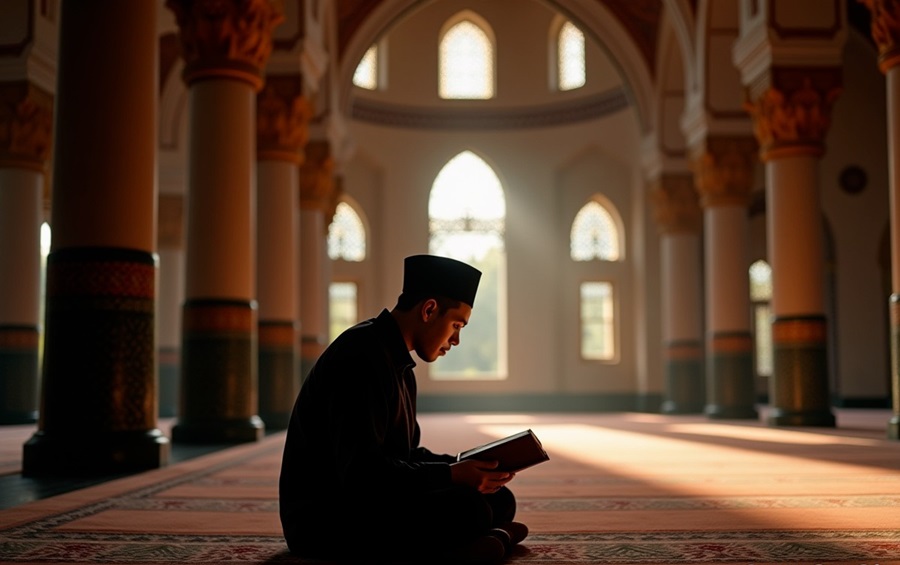In a hadith mentioned:
For the authority of Abu Hurairah, may God be happy with him, he said: “My girlfriend, may God give him up and give him peace, recommend me three: fasting three days every month, and kneel the sacrifice, and the womb before I sleep” agree.
It means: “From Abu Hurairah Radhiyallahu ‘anhu, he said:” My friend, may Allah give him and give him peace, order me to do three things: fasting three days every month, doing two prayer rak’ah, and praying with Witer before going to sleep. “Muttafaqun ‘alaih.”
Imam An-Nawawi combines the hadith above in his book, Riyadlush Shalihin [1]. A glimpse of the hadith above explains the three messages of the Prophet to Abu Hurairah. In the book Riyadlush Shalihin It was also mentioned that a similar will had also been given to Abu Darda`.
Abu Hurairah was one of the prophets who converted to Islam just before the Prophet died. He only held the Prophet in centuries soon, only a few years. Because of his hatred from other Abu Hurairah, he dedicated time with the Prophet to gain as much knowledge as possible. Abu Hurairah is even among Ahlush Shuffah [2] .

In addition, Abu Hurairah is the latest reading of the hadith of the Prophet Sallalahu ‘Alaihi wa Sallam. It is said that Abu Hurairah dedicated all his time to take the hadith from the Prophet when other people were busy with agricultural and trade affairs. Thus, it is not surprising that the Prophet gave him a special will.
The translation of the three wills is as follows:
Fasting three days every month hijriyah
In this case the fasting in question is general without any time provision. In another narration it is stated that the virtue of fasting three days per month is the reward like the reward of fasting for a full year [3].
Imam An-Nawawi said that it was more important if the three-day fasting was carried out to coincide with Lawamul Bald (White Day/Purnama White Moon Day) or coincide with the 13th, 14th, and 15th every Hijriyah month. This is because there is a hadith that explains that what is meant by fasting three days each month is fasting Lawamul Bald. In addition there is also a hadith that explains that the Prophet never left fasting Lawamul Bald either when safar or mukim/not traveling.
However, there is actually no limit that states that fasting three days every month must coincide with Ayamul Bald. Even in another hadith it is stated that you can do fasting three days every month on any day. The following is the pronunciation of the hadith:
Aisha asks the Prophet’s husband, that God’s prayer and peace will be with him, God’s messenger, may God give him and give him peace so that I say to him from days every month, he will say that he does not care about days in the fasting month.
It means: “He (Mu’adzah Al-‘Adawiyah) asks’ Aisha’s wife of the Prophet Sallallaahu ‘Alaihi wa Sallam:” Is the Prophet Sallallaahu’ Alaihi wa Sallam fast every month? He answered: Yes. I asked again: how much he is fast? He answered: He did not question the day he was fasting. “
So, if we cannot fast in Ayyamul Bidl, we can fast for three days. Wallahu a’lam.
Two Dhuha rak’ahs
Dhuha prayer is a sunnah prayer which is performed at Dhuha, starting after the sunrise and rises about seven cubits and ends before the Dhuhur prayer.
Dhuha prayer is done with even rak’ah, with a minimum of 2 rak’ahs. There are many priority dhuha prayers as explained by scholars. This is also a authentic hadith that mentions this priority. Dhuha prayer is the Awwabin prayer (prayer of repentance) as explained by the following hadith with the following hadith:
That Zayd Ibn Arqq sees people who pray from sacrifice, and he says: “Do you know that prayer is apart from this hour, the best of God, the best of God he conveys the two books when the separation is seen.
It means: “Zaid bin Arqam has seen people who do dluha prayers, and he said:” Do they not know that prayers outside this time are more important? Because the Prophet Sallallaahu ‘Alaihi wa Sallam said: “Awwabin’s prayer (repenting) was done when the camel’s son began to move because of heat.”
Among the virtues of Dhuha prayer is Dhuha prayer is a form of shadaqah our bones every morning. As explained by the following hadith:
It becomes a deed of one of you: all your peace is charity, and every body of deeds is charity, and every ceasefire is charity, and all truth, and truth, and forbidden for the denominator. And permitted from that, two rak’ahs, kneel from sacrifice.
It means: “Each of your joints is obliged to give alms every morning:” Subhanallah “Speech each is charity, every word” Alhamdulillah “is a gift, every word” la ilaha illa Allah “is charity, every” Allahu Akbar “Speech is a charity, Ama Ma’ruf is a gift, and naahi munk.”
Witir prayer before bed
Witir prayer is a sunnah prayer that is done in an odd number of rak’ahs with a minimum of 1 rak’ah. The implementation is between after Isha until before Fajr. Witir Prayer is recommended as a closing of the Tahajud Prayer/Night Prayer. As mentioned in the following hadith:
For the authority of Ibn Omar, may God be happy with them, for the authority of the Prophet, may God’s prayers and peace be on him, He said: ”
It means: “From Ibn ‘Umar Radliyallahu’ Anhuma. Prophet Sallallaahu ‘Alaihi wa Sallam said:” Make a prayer by closing your evening prayer. “
In the Prophet’s will above it is stated that Abu Hurairah was ordered to do Witir before going to sleep. In some statements it is stated that the order is because at the end of the night Abu Hurairah was busy studying and re -examining what he got from the Messenger of Allah [4].
Even so this does not violate the hadith which explains the virtue of Witir as a closing night prayer. It was even mentioned in another narration that Witir prayer may be done before going to sleep for people who are unable to do it after sleep [5]. This is the same as the state of Sayyidina Abu Bakar who did the Witir prayer before going to sleep because he was unable to do it at the end of the night.
Because the argument that explains Witir’s prayers before going to sleep and at the end of the night, these two things can be done depending on the state of the mukallaf. When he can pray at the end of the night, he must do it at the end of the night. But if he can’t do it at the end of the night for a reason, then he can pray before going to sleep. Wallahu a’lam.
That’s the explanation of the will of the three prophets for Abu Hurairah. Although the sentence context in the hadith above is intended for Abu Hurairah, it is not wrong to follow it because it is not a priority in these practices. Also in many hadiths it is said that the practice is not only for some people. Wallahu a’lam
Also Read: The Story of the Trumpers of the Friends of the Drunchers of the Prophet, Who Is Him?
[1] Lohahat Book Riyadlush Shalihin Arrangement of Imam An-Nawawi, K. Al-Fadha`il, B. Istihbabu Shaumi Tsalaatsati Ayyamin Min Kulli Syhr, p. 1258, p. 331
[2] Ahlus Shuffah is a term for the Companions of the Prophet Muhammad who did not have wealth and place to live in Medina, then lived in the Nabawi Mosque section named Shuffah. They live Zuhud’s life, focus on worship, and study religious knowledge and the Qur’an under the guidance of the Prophet directly.
[3] Abu Hurairah said I heard God’s messengers, hopefully God’s prayers and peace are above him, saying: Fasting Three days every month from fasting
Meaning: Abu Hurairah Radhiyallahu Anhu said: “I hear the Prophet Sallallaahu ‘Alaihi wa Sallam said,’ fasting three days every month as a full year ‘” “
[4] See the settings of Riyadlush Shalihin Shalihin al-‘utsaiimin.
[5] See the Book of Murighul Maram Order from Ibn Hajar al-Asqalani, K. Ash-shalah, b. Shalah Tathawwu ‘, h. 308.
Author: Shofiyah Nur Azizah
Editor: Muh. Sutan
News
Berita
News Flash
Blog
Technology
Sports
Sport
Football
Tips
Finance
Berita Terkini
Berita Terbaru
Berita Kekinian
News
Berita Terkini
Olahraga
Pasang Internet Myrepublic
Jasa Import China
Jasa Import Door to Door



